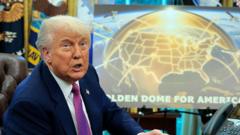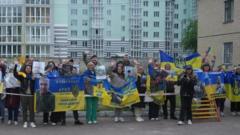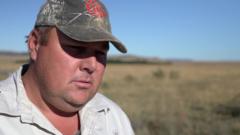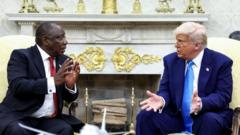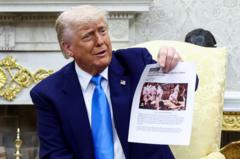Despite a challenging meeting with Trump, Ramaphosa's composed response reminds South Africans of his leadership qualities. The aftermath of the encounter could strengthen his government despite internal pressures.
Ramaphosa's Diplomatic Dance: Navigating Trump's Assault and Domestic Pressure

Ramaphosa's Diplomatic Dance: Navigating Trump's Assault and Domestic Pressure
South African President Cyril Ramaphosa faced a tumultuous Oval Office encounter with Donald Trump but may find unexpected political benefits at home.
South Africa's President Cyril Ramaphosa embarked on a pivotal visit to Washington this week, hoping for diplomatic warmth but was instead met with President Donald Trump's controversial claims about a supposed "white genocide" in the country. The meeting, broadcast to millions, turned into a high-stress diplomatic confrontation, marked by insults rather than the hoped-for partnership.
Ramaphosa's steady demeanor amid Trump's fury drew praise from many commentators back home, while some critics argue he missed an opportunity to vigorously address the president's unfounded assertions. His challenges, however, await him in South Africa, where he leads a fractious coalition government formed after the African National Congress (ANC) suffered poor results in recent elections.
The ANC's tenure has been tumultuous, marked by disputes over policy matters, including land reform and taxation, and struggles within both the party and the coalition. Ramaphosa now faces economic stagnation, rising crime rates, corruption, and crumbling public services, leaving his presidency under intense scrutiny from both political factions and civil society.
Additionally, Ramaphosa contends with powerful opponents, including Julius Malema of the Economic Freedom Fighters (EFF), who was featured in a video shown by Trump that allegedly portrays him singing a controversial song about violence against farmers. As Ramaphosa sought to solidify trade relations and attract investment from the US to counteract joblessness and bolster the failing economy, Trump's focus on divisive rhetoric overshadowed the targeted economic discussions.
However, the fallout from the meeting might not all be detrimental for Ramaphosa. Observers suggest his performance may enhance his support domestically, reinforcing his role as a skilled negotiator known for maintaining stability in the country amid chaos. Ramaphosa's historical legacy includes crucial roles in the nation's movement away from apartheid and the subsequent reconstruction efforts.
Political analysts believe that while Ramaphosa faces a daunting array of challenges, his measured response during the Trump meeting may bolster his reputation and governability, especially as the national mood calls for unity and stability amidst growing discontent. Supporters argue that his presence reminded the public of the importance of strong leadership and diplomatic experience in difficult times.
Moreover, the optics of the meeting, where key figures from South Africa's diverse political landscape joined Ramaphosa in countering Trump's claims, offer a potent symbol of unity that could resonate positively with the electorate. This coalition support may protect Ramaphosa’s government from further fragility amid ongoing political tension within the ANC and among its partners.
As the dust settles from the controversial exchange, it appears Ramaphosa's ability to navigate this crisis could serve to reinforce his position within South African politics. The monumental occasion reminds citizens of his diplomatic experience and capability to steer the nation through turbulent waters, potentially re-establishing confidence in his leadership approach as the country heads toward future elections.


